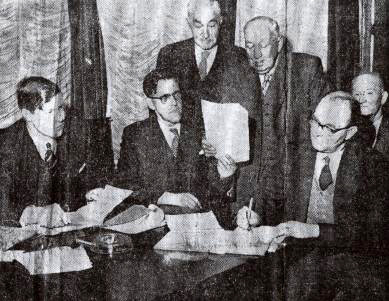|
 The Photograph shows a Manor of Brierley Court Leet meeting on 1st
November 1961. On the left seated George Michael Foljambe, stood up on the
left is Thomas Moxon (b.1877) who is next to Arthur Hargreaves. The Photograph shows a Manor of Brierley Court Leet meeting on 1st
November 1961. On the left seated George Michael Foljambe, stood up on the
left is Thomas Moxon (b.1877) who is next to Arthur Hargreaves.
Photograph reproduced from an old newspaper
cutting.
For many years following the end of the Second
World War my father, Stan Bristow, covered an area to the east of
Barnsley, in the former West Riding of Yorkshire, as a district reporter
for the South Yorkshire Times. This job entailed a close
involvement in the minutiae of life in half a dozen thriving pit villages
including Cudworth, Brierley, and Grimethorpe. He became a member of
Hemsworth Rotary Club and, I suspect, it was in this connection that he
wrote the following, originally scripted as an after dinner speech.
For those interested
in local and family history, the talk shows how the ancient manorial
courts leet survived in areas where common land remained to be
administered Where court rolls and records survive, they provide family
historians with a valuable supplement to parish registers and other parish
records. In some areas, records of the court leet and court baron exist
that pre-date parish registers by as much as 300 years.
The talk was
probably written in the early 1960s. and is already a piece of history in
itself with its reference to the Coal Board and the 'success of the mining
industry'. All the pits in the area were closed down following the miners'
strike in the mid- 1980s.
So sit back with your
glass of brandy, and your after-dinner cigar. May I introduce Mr Stan
Bristow, who is going to tell us something about the ancient Court Leet of
the Manor of Brierley?
'Because our
present-day community is founded upon coal and the success of the mining
industry, we are apt to look back no further than the industrial
revolution when contemplating the historical background of the area in
which we live, That, of course, is quite wrong, for long before the first
shaft was sunk, there were happy agricultural communities thriving in this
part of South Yorkshire, and their antiquity is underlined by the fact
that at Brierley we can boast of having one of the few manorial
courts remaining in existence in this country.
'Although I was born
in this area, I knew nothing of the Court until some 15 years ago when,
browsing around the district, I looked upon a public notice board in the
village of Brierley and, mixed up with the notices announcing beetle
drives and Women's Institute meetings, I came across a quaintly worded
edict, which caught me smack between the eyes.
'It informed me, and
all others who chanced to pause and read, that the Court Leet of Our
Sovereign Lady the Queen, with the Tourn and Great Court Baron of Edmund
Walter Saville Foljambe Esquire, would assemble at the Three Horse Shoes
Inn, and the proclamation charged all freeholders, leaseholders and other
tenants belonging to the Manor of Brierley, owing suite and service to the
court, to be there then to do the same, or omit at their peril.
'Although, as far as
I know, I owed neither suit nor service to my lord of the manor, I decided
that, in my professional capacity, I should seek to attend the meeting of
the Court.
'That raised a
difficulty for, as a journalist, although the government had by an Act of
1908 given me statutory right of attendance at certain local authorities'
meetings, as far as I could ascertain, court leets were not included.
Which, when one came to consider the point, was not unnatural, because
when the courts were in there heyday, Caxton and his printing press had
not been thought of, much less the Daily Express or the South
Yorkshire Times.
.However, my
approach for permission to attend brought a ready agreement and one
morning, as I stepped over the threshold of the Three Horse Shoes Inn,
into the raftered bar parlour, I got the feeling, as I have done each time
I have attended an assembly of the Court, that I was stepping back down
the ages.
'As I entered, a
bailiff was just calling "Oyez, oyez! All manner of persons that have
anything to do at the Court Leet here about to be Holden for the Manor of
Brierley, draw nigh and give your attendance, and ye shall be heard".
'That, I think,
is a good point to break off and tell you something about the origin and
purposes of these ancient courts.
'In medieval times,
everyone who held land within a manor was subject to the jurisdiction of
the manorial court, whose powers varied from district to district. In
general, the courts divided into two sections - as you heard in the
proclamation of the Brierley court - the court leet and the court baron.
The court leet dealt with criminal offences and the court baron with the
economic problems of the manor: the problems of cultivation, services
provided to the lord and the transference of holdings of land. The courts
nominated their own officers for many of the positions in the small
communities over which they had jurisdiction.
'In the court leet,
appointments included those of ale taster (a much sought after job, no
doubt), pinder (impounder of stray animals), pound keeper (the pound being
where straying animals were held), dyke reeve, burleyman (enforcer of
byelaws) and, sometimes, inspector of weights and measures.
Local History archives
index |